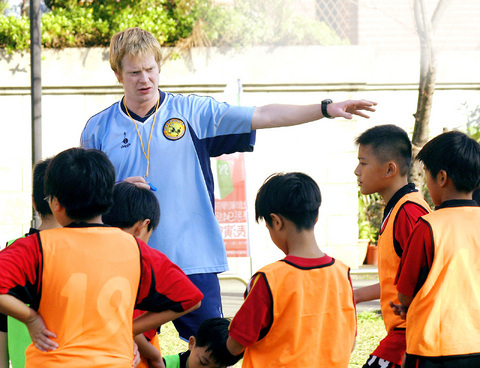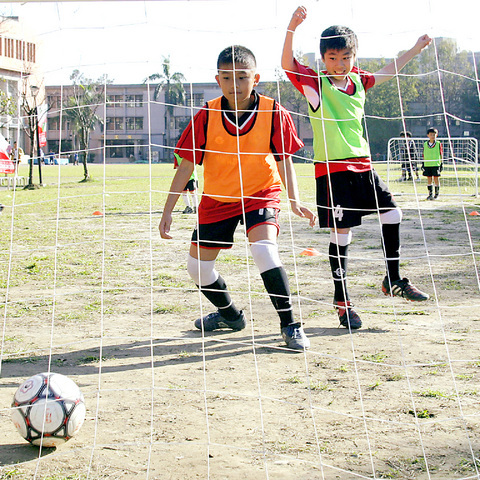Ask any kid from Tipperary to Tokyo who Zinedine Zidane, Pele and Michael Owen are and they're practically guaranteed to know. Pose the same question to kids in Taipei, however, and there's a strong chance that you'll be met with shrugs of indifference and vacant stares. After all, in Taiwan, the common cold is much more of a conversation starter than "football fever."
Currently, only a handful of public schools encourage students to play "the beautiful game," and, more often than not, such classes cover little but the fundamentals. Well-organized classes offering in-depth studies of the game's intricacies and providing lessons in soccer history are few and far between.

PHOTO COURTESY OF SHI DA-WEI
All that changed in July of this year, however, when five members of the Taipei-based expat soccer team The Animals established the Master Football Academy (MFA), Taiwan's first and only foreign-managed private soccer school for local children. Although at present only based in Taipei, MFA founders hope that within a few years the soccer academy will have branches nationwide.

PHOTO COURTESY OF SHI DA-WEI
The MFA not only aims to teach local kids the basics of soccer, but also gives them a chance to better understand soccer's many nuances. By teaching everything from the offside rule to correct on-field etiquette, the MFA is trying to achieve something that has never been attempted on such a level in Taiwan before.
"Basically, there's no structure to kids' football in Taiwan," said MFA head coach, Daniel Calvert. "Some schools have teams, but there's no one [group] managing it, which makes [soccer] very disorganized," he said.
To bring order to Taiwan's youth soccer scene, the five friends invested NT$1.5million in the academy. The investment was in turn divided up and used to purchase equipment, set up a Web site and, more importantly, to research methods and concepts used to teach children soccer in the UK.
Before it opened for business this summer, Calvert returned to his native England. There he put himself through the Football Association's -- the UK soccer governing body -- rigorous coaching program and visited several soccer schools run by professional teams to see how they set about transforming their students into skilled players.
"I went to Leicester City and Peterborough United to see their academies and to talk to the staff about ideas and coaching methods and I also spoke with the [Football Association]," he said. "Along with giving ideas about drills, they also [stressed] the importance of motivation and positive feedback."
To date, the academy has between 80 and 90 children aged between 4 and 12 years old on its books and holds classes on Saturdays and Sundays in Taipei's Neihu and Da-an districts. Classes run between one and two hours and at each session coaching staff teach individual skills and team-play techniques.
The academy provides each student with a specially designed kit and allows each child to pick his own number. The most popular number is 7, that of England international player David Beckham.
"It's a bit difficult to get a kit to fit a 4-year-old, but do we manage to make everyone feel like they belong to a team," said the MFA's Michael Chandler.
To make learning fun and to provide the students with incentives, the MFA's specially devised program is divided into two main areas. The "Trick Cap Scheme" focuses on individual skills and techniques and teaches students how to juggle, catch and raise the ball with their feet.
The most comprehensive MFA scheme is the "Master Badge Medals System," which provides kids with both individual and team-based soccer knowledge from basic passing to dribbling and from taking penalty kicks to set-piece free kicks.
After several weeks of study each student is then tested on the specifics of the level. Upon passing a series of set tests, the kids are awarded with a certificate and a sew-on patch.
"The awards give the kids something to look forward to and give the parents something solid that proves that their child has developed and that it's not a waste of time," said Chandler.
For safety reasons, MFA insists that students wear shin guards at all times. Although the academy is only a few months old, its classes are already proving popular with both students and parents alike.
"The feedback has been very positive. The parents like it that we teach in English and I think that they see it as something different for Taiwan," said Calvert.
"As there's really no organized sport in Taiwan for kids, they see it as s form of exercise. And of course [the students] get to interact with their friends and have fun at the same time."
Along with training, the MFA also takes its students indoors and screens video footage of some of soccer's greatest players in action and holds mini-lectures about tactics, techniques and rules. Even though all MFA classes are taught in English, something that might seem daunting for kids under 12, the indoor theory lessons are proving as popular as the outdoor skills classes.
Of course, dealing with children brings its share of unique difficulties. For many, the difference between winning and losing can be an especially emotional experience.
"The main [principle] is to keep it fun. One of the things we try to get across is that it is only a game," said Calvert. "We teach them how to lose and how to win well."
To keep the players in line, red and yellow cards are displayed just as in regular soccer.
"They're off for two minutes if they get a yellow and five minutes if it's a red," said Calvert. "It does work. They hate [being off the field]."
Contact:
For information about the Master Football Academy classes, log onto its Web site at www.mfa.com.tw or
call (02) 8772 5262.

The canonical shot of an East Asian city is a night skyline studded with towering apartment and office buildings, bright with neon and plastic signage, a landscape of energy and modernity. Another classic image is the same city seen from above, in which identical apartment towers march across the city, spilling out over nearby geography, like stylized soldiers colonizing new territory in a board game. Densely populated dynamic conurbations of money, technological innovation and convenience, it is hard to see the cities of East Asia as what they truly are: necropolises. Why is this? The East Asian development model, with

June 16 to June 22 The following flyer appeared on the streets of Hsinchu on June 12, 1895: “Taipei has already fallen to the Japanese barbarians, who have brought great misery to our land and people. We heard that the Japanese occupiers will tax our gardens, our houses, our bodies, and even our chickens, dogs, cows and pigs. They wear their hair wild, carve their teeth, tattoo their foreheads, wear strange clothes and speak a strange language. How can we be ruled by such people?” Posted by civilian militia leader Wu Tang-hsing (吳湯興), it was a call to arms to retake

This is a deeply unsettling period in Taiwan. Uncertainties are everywhere while everyone waits for a small army of other shoes to drop on nearly every front. During challenging times, interesting political changes can happen, yet all three major political parties are beset with scandals, strife and self-inflicted wounds. As the ruling party, the Democratic Progressive Party (DPP) is held accountable for not only the challenges to the party, but also the nation. Taiwan is geopolitically and economically under threat. Domestically, the administration is under siege by the opposition-controlled legislature and growing discontent with what opponents characterize as arrogant, autocratic

When Lisa, 20, laces into her ultra-high heels for her shift at a strip club in Ukraine’s Kharkiv, she knows that aside from dancing, she will have to comfort traumatized soldiers. Since Russia’s 2022 invasion, exhausted troops are the main clientele of the Flash Dancers club in the center of the northeastern city, just 20 kilometers from Russian forces. For some customers, it provides an “escape” from the war, said Valerya Zavatska — a 25-year-old law graduate who runs the club with her mother, an ex-dancer. But many are not there just for the show. They “want to talk about what hurts,” she